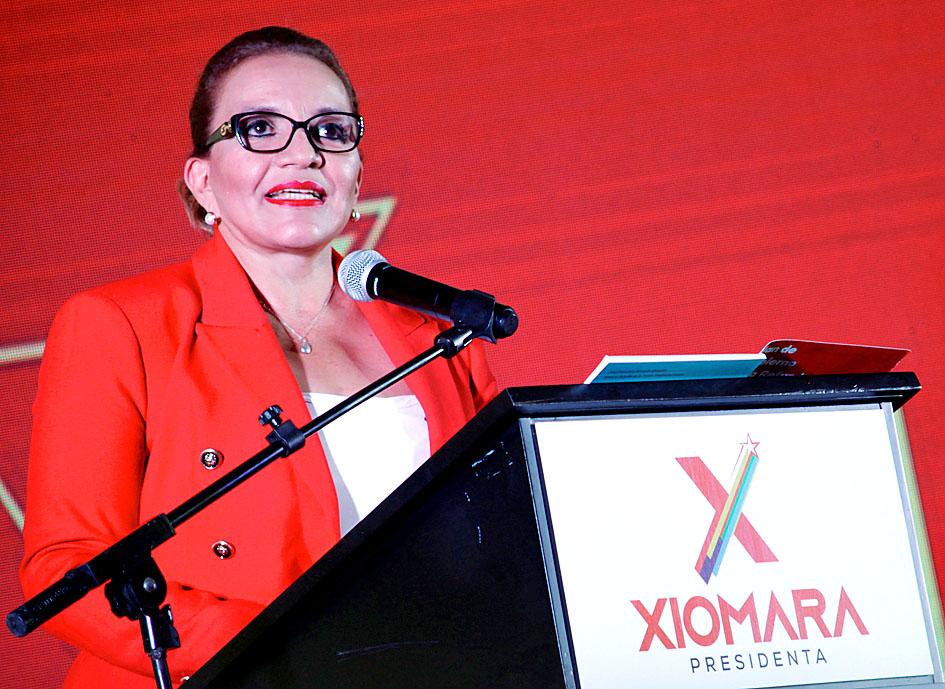Taiwan yesterday reminded its diplomatic ally Honduras of Beijing’s record of broken promises, after the Latin American nation’s main opposition party pledged to switch diplomatic recognition to Beijing.
The left-wing Liberty and Refoundation Party (LIBRE), led by ousted former Honduran president Manuel Zelaya, on Sunday said that if it wins November’s presidential election it would seek to establish diplomatic relations with China and “readjust” the country’s debt.
The party is for a second time fielding Zelaya’s wife, Xiomara Castro, who set out her plans at a news conference in Tegucigalpa.

Photo: Reuters
“I will order an international audit on the internal and external debt, and the readjustment of it,” said Castro, 61, without elaborating on what steps that would entail.
Honduras currently has diplomatic relations with Taiwan, but if victorious, Castro said she would “immediately open diplomatic and commercial relations with mainland China.”
Honduras is among only 15 UN member countries that maintain formal relations with Taiwan.
“Honduras must understand that the Chinese government’s promises have always been all flash and no substance,” Ministry of Foreign Affairs spokeswoman Joanne Ou (歐江安) said, adding that Beijing would try any “ploys to sabotage Taiwan’s diplomatic relations with our allies.”
The government was aware of the agenda outlined by LIBRE candidate Castro and would pay close attention to any developments, she added.
Taiwan and Honduras have enjoyed diplomatic relations for 80 years, during which they have cooperated on many successful projects universally supported by the Honduran government and its people, Ou said.
Building on this deep friendship, Taiwan would continue to improve cooperation and consolidate ties between the two nations, she added.
At the end of last year, Honduras had public debt of more than US$13 billion, equivalent to 55 percent of GDP, Honduran Ministry of Finance data showed.
Of that, US$8.45 billion was foreign debt.
No reliable polling has yet been published for the election, in which several candidates are to face Tegucigalpa Mayor Nasry Asfura, who is backed by Honduran President Juan Orlando Hernandez.
Hernandez’s rule has been dogged by allegations of vote-rigging in 2017 and accusations raised in US courts, which he denies, of his links to drug traffickers.
However, he remains an influential figure and his National Party is still the strongest force in Honduran politics.
Additional reporting by AFP

Nvidia Corp yesterday unveiled its new high-speed interconnect technology, NVLink Fusion, with Taiwanese application-specific IC (ASIC) designers Alchip Technologies Ltd (世芯) and MediaTek Inc (聯發科) among the first to adopt the technology to help build semi-custom artificial intelligence (AI) infrastructure for hyperscalers. Nvidia has opened its technology to outside users, as hyperscalers and cloud service providers are building their own cost-effective AI chips, or accelerators, used in AI servers by leveraging ASIC firms’ designing capabilities to reduce their dependence on Nvidia. Previously, NVLink technology was only available for Nvidia’s own AI platform. “NVLink Fusion opens Nvidia’s AI platform and rich ecosystem for

‘WORLD’S LOSS’: Taiwan’s exclusion robs the world of the benefits it could get from one of the foremost practitioners of disease prevention and public health, Minister Chiu said Taiwan should be allowed to join the World Health Assembly (WHA) as an irreplaceable contributor to global health and disease prevention efforts, Minister of Foreign Affairs Lin Chia-lung (林佳龍) said yesterday. He made the comment at a news conference in Taipei, hours before a Taiwanese delegation was to depart for Geneva, Switzerland, seeking to meet with foreign representatives for a bilateral meeting on the sidelines of the WHA, the WHO’s annual decisionmaking meeting, which would be held from Monday next week to May 27. As of yesterday, Taiwan had yet to receive an invitation. Taiwan has much to offer to the international community’s

CAUSE AND EFFECT: China’s policies prompted the US to increase its presence in the Indo-Pacific, and Beijing should consider if this outcome is in its best interests, Lai said China has been escalating its military and political pressure on Taiwan for many years, but should reflect on this strategy and think about what is really in its best interest, President William Lai (賴清德) said. Lai made the remark in a YouTube interview with Mindi World News that was broadcast on Saturday, ahead of the first anniversary of his presidential inauguration tomorrow. The US has clearly stated that China is its biggest challenge and threat, with US President Donald Trump and US Secretary of Defense Pete Hegseth repeatedly saying that the US should increase its forces in the Indo-Pacific region

ALL TOGETHER: Only by including Taiwan can the WHA fully exemplify its commitment to ‘One World for Health,’ the representative offices of eight nations in Taiwan said The representative offices in Taiwan of eight nations yesterday issued a joint statement reiterating their support for Taiwan’s meaningful engagement with the WHO and for Taipei’s participation as an observer at the World Health Assembly (WHA). The joint statement came as Taiwan has not received an invitation to this year’s WHA, which started yesterday and runs until Tuesday next week. This year’s meeting of the decisionmaking body of the WHO in Geneva, Switzerland, would be the ninth consecutive year Taiwan has been excluded. The eight offices, which reaffirmed their support for Taiwan, are the British Office Taipei, the Australian Office Taipei, the